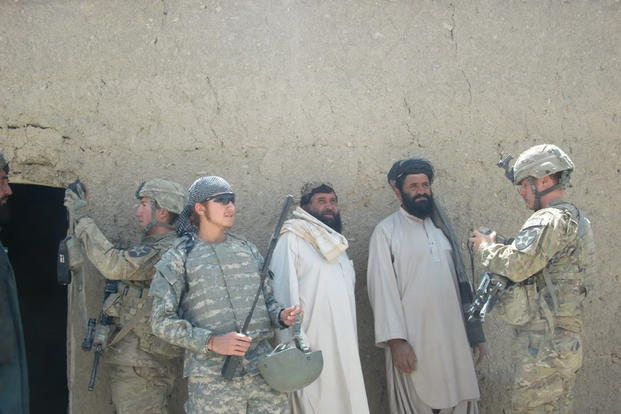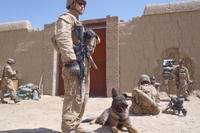Spencer Sullivan is an Army cavalry veteran and currently works as the director of training and development for a cybersecurity provider. He resides in Arlington, Virginia, with his wife and son. Follow him on Twitter @Spencer_Sully1.
America is finally pulling out of Afghanistan after 20 years of conflict. That means many things to many people in the armed services, but it means more to the people of Afghanistan. As this website has reported on many occasions, countless Afghans who served as interpreters are being left behind to face the increasingly dominant Taliban.
One of these young men, Abdulhaq, was my interpreter during my time in Afghanistan. With the Taliban closing in on him, he decided to take matters into his own hands and flee Afghanistan for the equally dangerous path of a refugee. As I recount his story, I want the reader to consider what we owe the people of Afghanistan, and what we owe ourselves as international defenders of freedom.
Abdulhaq served as an interpreter for a little over two years spread out between 2010 and 2013, the midpoint of the war as we now know in retrospect. He joined Mission Essential Personnel, one of the main contracting vehicles for such positions. Abdulhaq was assigned to American infantry, cavalry and logistical units in Farah, Zabul and Kabul provinces. He went on hundreds of combat missions during his time as an interpreter.
During his service, he survived an improvised explosive device blast that left him with permanent damage to his spine, neck and head. His collective experiences left him with a diagnosed case of post-traumatic stress disorder and somatized pain disorder, not to mention sleepless nights, nightmares, anxiety and depression.
As veterans, we understand the dangers of combat deployments; but whatever the events of our deployments, we go home. For men like Abdulhaq, the reality of life in Afghanistan never ends. Whatever his actions, the consequences reverberate long after everyone else has gone home. The Taliban have enacted a campaign of revenge killings against men like Abdulhaq who aided NATO and U.S. forces.
Another of my interpreters who served alongside Abdulhaq was systematically tracked down and executed by the Taliban in 2017. Sayed's death directly led the nonprofit charity No One Left Behind to begin tracking such incidents. To date, it is the only organization with any true data on the death toll suffered by this demographic. After Abdulhaq's neighbor, who served as a fuel truck driver, was executed by the Taliban while standing in his own front door, Abdulhaq decided he had to leave his home forever and flee.
He traveled by taxi and plane. He was stuffed in the back of trucks, cars and vans; traveled on foot at times; and on trains through Iran, Turkey, Greece, Spain and eventually to Germany. Along the way, he was savagely beaten by smugglers and Turkish police, was blindly shot at during nighttime border crossings through snowy mountains, slept outside exposed to the elements for weeks, and was imprisoned three times. He spent nearly the entirety of his family's collective wealth, amounting to roughly $15,000 over seven months, to eat, buy fake IDs, and pay smugglers. He made 16 attempts to get out of Greece alone via shipping containers, trucks and airports before he was finally lucky enough to get through.
Upon arriving in Germany, he was immediately denied asylum due to "lack of evidence indicating a direct threat to his life." Two years into his appeal, he has become suicidal and threatened to light himself on fire in front of the U.S. Embassy in Berlin if he is deported back to Afghanistan.
He has renounced Islam, making him an apostate in the eyes of his family and fellow countrymen. If he is deported, his family and community would be duty bound to kill him. With the U.S. withdrawal and the inevitable Taliban takeover of the country, such an execution wouldn't even be uncommon.
Abdulhaq's journey out of Afghanistan and into Europe is an astonishing panoply of heroic and horrifying moments. It is also the baseline experience for hundreds of thousands of voiceless refugees braving the perilous and too often deadly journey west. Knowing that true peace and democratic change is a slow, generational process, many have chosen to seek these human rights in their own lifetimes. And yet, even though they've been given the (false) promise of a more democratic society within their own borders, multitudes have had that door of opportunity slammed in their faces at every turn.
What do we owe people like Abdulhaq? America has sunk more than $2 trillion in treasure and 2,300 lives into the war over 20 years. In the basest terms, that is an accounting of what we have given, but do we ever truly stop to ask what we have taken? War ignites bitterness and resentment that echoes for generations. Afghans, more so than Americans, have a long memory for such things. Abdulhaq's family is financially destitute and looking down the barrel of another Taliban regime in spite of all our efforts.
For my part, I have offered Abdulhaq friendship and a voice. Perhaps it is time that American policymakers take a closer look at what they can do to aid those we've left behind in the wake of the war in Afghanistan. That begins with the modest baseline of not restricting the Special Immigration Visa, or SIV, program created by then-U.S. Ambassador to Afghanistan Ryan Crocker for interpreters just like Abdulhaq, and perhaps even easing some of the nonsensical bureaucratic obstacles inherent to the SIV application process.
My interpreter who didn't make it, Sayed, applied for an SIV in 2013. He was murdered in 2017. In 2018, I received an email from the SIV office asking if my letter of recommendation for Sayed written in 2012 was legitimate, and if I still recommended him for the program so they could begin the process. I informed them that Sayed had died while they took five years to start his paperwork.
There is much we can and should do for our veterans, certainly, but we can and must do better for those Afghans we've left behind.
-- The opinions expressed in this op-ed are those of the authors and do not necessarily reflect the views of Military.com. If you would like to submit your own commentary, please send your article to opinions@military.com for consideration.















